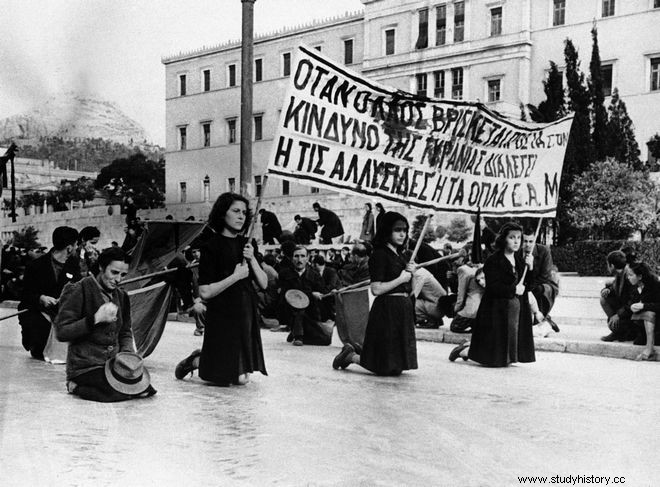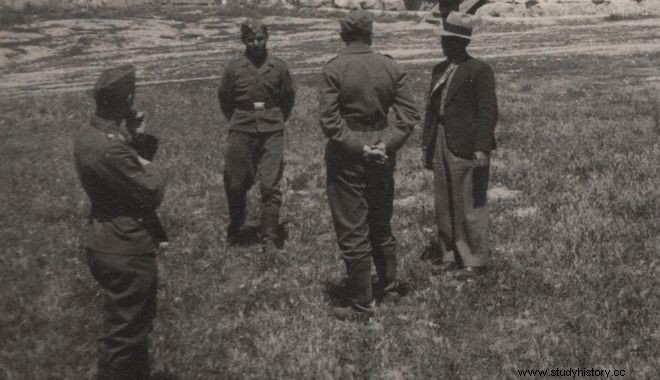Corner of Stadium and Bucharest, October 12, 1944, Athenians celebrate liberation from the Nazis.
Exactly 76 years later, a few kilometers away, at the Court of Appeal of Athens, the sentences for Hitler's nostalgics and the rioters are being announced today.
The celebration began on October 11, with the conviction of the criminal organization.
So the condemnation of Golden Dawn as a criminal organization , the anniversary coincides with the liberation of Athens, in a symbolic juncture. It coincides with the day the capital was evacuated by German troops after 1264 days of occupation.
The Nazis lowered their flag from the Acropolis at 9.45am on 12 October, and at the same time part of the German army laid a wreath at the monument to the Unknown Soldier. Helmut Felmy, German vice-general, military commander of Southern Greece, announced the withdrawal of the troops, while the Security Battalions collaborating with the invaders, were closed in the camp in Goudi.
Of course, the "seed of the defeated" was destined to remain rooted in the country, as Michaloliakos himself proudly argued, acting in the shadows of a system that, until recently, pretended not to know the truth. Of the system that sometimes pampered the neo-Nazis, sometimes used them, sometimes ignored them, believing that they would be "democratized".
"It was a cart loaded with young men and women who were shouting. On the horse that pulled the cart sat a woman as dark as a gypsy woman who had on her head and shoulders a shawl of revolutionary crimson. She was wearing a yellow dress and had various charms on her chest, she was holding a Greek flag and chanted:"Taken from the bones...". A group of guys were walking around with a cardboard Hitler hanging on a pole and rhythmically chanting "Embatirise".. Many trams and trucks were going up and down the main streets loaded with EAM-ELAS children who shouted slogans of their organizations. I also saw a parade of children with wooden rifles, the "children's front" of EAM , the writer Giorgos Theotokas wrote about the "big day" (Giorgos Theotokas, Calendar Notebooks, Athens:Hestia).
The 1st Army Corps of ELAS took care of that day, so that the spontaneous manifestations of joy were guarded.
Below you can see a color restoration of the @kaplanisart page, in the historical photo of Voula Theoharis Papaioannou. Papaioannou (1898 – 1990) collaborated during the Occupation with the Swiss committee of the International Red Cross, capturing the everyday life of the residents of the Greek capital.
The work of Voula Theoharis Papaioannou can be seen here.
Subsequently, on October 12, 1944, engineering units of ELAS cut the wires of the mines at Ellinikos (Hassani) airport, at the Marathon dam, while forces of the II Division of ELAS Attica clashed with the retreating Germans in Kakosalesi.
On the same day, a unit of British paratroopers fell in Megara. This unit together with the British Brigade, which arrived on the 14th of October, moved towards Athens together with the other British units of Operation MANNA which started to arrive on the 15th of the month.
The last days of the Occupation were not bloodless. With targeted attacks two days before their retreat, Germans and Security Battalions executed 47 people and set fire to 400 houses in Koropi. On the eve of the Liberation, Germans attacked the refugee town of Kaisariani, a stronghold of the EAM, murdering by hanging the fighters they arrested. In Piraeus, the Germans caused destruction, following the "scorched earth" tactic in many cities of the country.
With the complete withdrawal of the Germans a three-member echelon of the Government of National Unity was installed in Athens by ministers F. Manuelidis, G. Zevgos and T. Tsatsos to take over the power of the liberated areas while the Police, under the orders of Angelos Evert, arrested the last occupying prime minister I .Ralli who had remained in the Metropolis throughout October 12. The same fate was shared by the first two-year-old prime minister, G. Tsolakoglou, and the ministers of his government, as well as newspaper directors who had openly collaborated with the Germans.
The three ministers of the Government of National Unity, after a eulogy in the Metropolis of Athens, addressed the crowd that had flooded Syntagma Square. This was followed by an entry into the city and a parade of 700 British commandos and 400 Holy Hierarchs. These sections ended up in Syntagma Square where they were inspected by the Military Commander of Attica appointed by the Government of National Unity P. Spiliotopoulos and they laid a wreath to the Unknown Soldier.
The day after the Liberation, the spontaneous celebrations of the Athenian people were followed by demonstrations of the organizations, first of the EAM and then of the "national organizations".
The official arrival of the Greek Government under G. Papandreou, in which the EAM participated with six ministers, took place on the morning of Wednesday, October 18, 1944. It was received by the entire Athenian people and the members of the government led by George Papandreou became received with cheers.
The government was accompanied by the British ambassador R. Leeper and Lt. General R. Scobie, commander of the Allied Forces in Greece, under whose orders EDES and ELAS had come under the Caserta Agreement.
The disagreement of the EAM regarding the question of the disarmament of ELAS led to the resignation of his ministers from the government. The EAM rally following the resignation on December 3, 1944, was beaten by the police and the EAM forces proceeded to attack police stations and pockets of government forces in Goudi and Makrygianni. With the involvement of the British on the side of the government forces, the conflict became generalized. For 33 days, fierce clashes took place in Athens, the Decembriana, which resulted in the military defeat of ELAS and the withdrawal of its forces from Attica.
The result of the December conflict was the Varkiza Agreement which, despite the hopes it gave birth to for the normalization of political life, ultimately became the prelude to the bloody civil war.

Losses
Greece lost about 10% of its total population (which then amounted to 7.3 million) due to hunger, hardships, bombings, war conflicts and executions while 880,000 were left disabled and unable to work (report by Ath. Sbarouni).
The Israelite Communities of Greece were decimated, as the majority of their members were murdered in the death camps. The losses reached 87% of the pre-war Jewish population of Greece, one of the highest percentages in Europe.
In implementation of the policy of blind retaliation the conquerors burned 1,170 villages, most of them in Epirus. Agricultural and industrial production experienced a dramatic decline. The destruction of the railway and road network, the Isthmus of Corinth, the facilities of the fully modernized port of Piraeus and the airports was total. 75% of the merchant fleet which before the war was the ninth largest in tonnage, and 1/4 of the buildings, about 1,500,000 houses, were destroyed.
Greece was forced to pay for both its military Occupation and the fulfillment of Axis military plans in the Eastern Mediterranean. In 1941-42 alone, it was estimated that the costs of the Occupation amounted to the equivalent of 113.7% of the national income (Ath. Sbarouni Report). As the Occupation costs continued to rise to eventually take on terrifying proportions, budget deficits rose to terrifying levels:from 4% in 1938-9 to 71% in 1941-2 and to 93% in 1943-44 (Bank of Greece Reports ).
Security battalions
Although from February 1944 they were characterized as dosilogians by all the resistance organizations in Greece and abroad, in September 1944, and while a significant number of their members had already been arrested before the liberation, very few were finally convicted.

The main reason was that until their trials the Decembrians had intervened and many of their members, at the urging of the British, were recruited by the Government of National Unity as a counterweight to the EAM, while the less experienced soldiers filled low-level administrative positions in the state machine.
After the Agreement of Varkiza and the disarmament of the Eamist organizations in early '45, and until the start of the Civil War in mid-'46, several former members of the Security Battalions participated in the pursuit of leftists, communists, and even anti-royalists in a period that became known as "white terror ".
Former security guards as well as political figures, collaborators of the Germans, survived until the Junta, in administrative positions. The Junta granted pensions to the former members of the Battalions , with decree 179 in '69.
Of course, as we said above, Nazi nostalgics remained active in the country over time, finding fertile ground within the channels of the system. Let us have no illusions , the judicial condemnation of AXA, is a victory for today, but above all, a democratic bet for tomorrow, so that we will not see fascists in the Greek parliament again.
It is not poverty that makes people fascists
As the historian Menelaos Charalambidis said to News 24/7 and Nikos Yiannopoulos (November 2018), commenting on the A.A.'s electoral percentages, before the debacle it suffered in the last elections:
"Always in Greece we had 5-10% juntas, royalists and extreme right-wingers. Now how consciously they believe it, if they have read my Agon, I don't know, but they are people who hate leftists and hate anything different from them. That's simple. These people they existed. I had the misfortune of knowing them since the 90s, like Dimitris Kousouris who by luck was spared. Now with the FSA what has changed is that people who were hit by the crisis found a role. People who lost their homes , they lost their jobs, they were ruined, we became nothing and the ACA found themselves saying to them "come on Wednesday afternoon we're going to do this, we're going to bore immigrants, we're going to bore communists etc". He found a meaning in his life. By chance , let's clear up another misunderstanding. It's not poverty that makes people fascists. That's a very conservative approach, it's lack of knowledge that makes them fascists. Whether poor or rich if someone lacks knowledge, be he is vulnerable to snarls. If he stands firm on values, he cannot be carried away by such situations".
Read the News from Greece and the world, with the reliability and validity of News247.gr.
